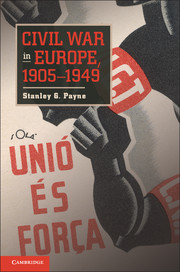Book contents
- Frontmatter
- Contents
- Preface
- Chronology of Events
- Glossary of Political Acronyms
- Introduction Revolution and Civil War as Forms of Conflict
- Part One World War I and An Era of Internal Conflict, 1905???1935
- Part Two The Conflict In Spain, 1931???1939
- 5 The Revolutionary Process in Spain
- 6 Revolution and Civil War, 1936???1939
- 7 Significance and Consequences
- Part Three Civil War and Internal Violence in The Era of World War II
- Index
- References
7 - Significance and Consequences
Published online by Cambridge University Press: 05 June 2012
- Frontmatter
- Contents
- Preface
- Chronology of Events
- Glossary of Political Acronyms
- Introduction Revolution and Civil War as Forms of Conflict
- Part One World War I and An Era of Internal Conflict, 1905???1935
- Part Two The Conflict In Spain, 1931???1939
- 5 The Revolutionary Process in Spain
- 6 Revolution and Civil War, 1936???1939
- 7 Significance and Consequences
- Part Three Civil War and Internal Violence in The Era of World War II
- Index
- References
Summary
The Spanish war was Europe’s most important conflict of the 1930s prior to the expansion of Nazi Germany. It produced the last of the collectivist revolutions in the sequence that had begun in 1917, but in Spain the revolution became partially subordinated to a military struggle that could not be entirely separated from quite different issues, some of them to be involved in World War II. Thus the right has seen the war as stemming from the upsurge in revolutionism that followed World War I, sustained by the Comintern and other revolutionary forces, while the left has preferred to ignore the revolution and the causes of the war in order to connect it, not with its causes and origins, but with its aftermath in other countries, as the “opening round” or “first battle” of World War II. There is some merit to both arguments, though somewhat more to the first than to the second.
All five of the major European powers responded to the war in different ways. British policy was the simplest, a hands-off approach except for intermittent humanitarian activities and attempts to maintain the freedom of the seas. It viewed Spanish politics as an unstable, amoral contest of extremes – an accurate evaluation, as far as it went. There was never any question of London supporting a violent revolution. Should Franco win, that could be accepted on the grounds that he would likely be an independent Spanish dictator with whom one could do business. And such, indeed, was eventually the way it worked out, though British policy overlooked the developing relationship between Franco and Hitler, which might have produced a different result.
- Type
- Chapter
- Information
- Civil War in Europe, 1905–1949 , pp. 181 - 190Publisher: Cambridge University PressPrint publication year: 2011



